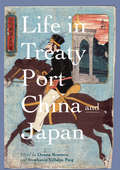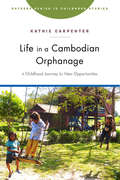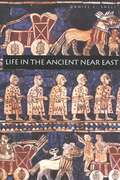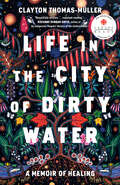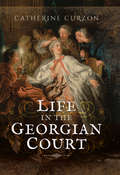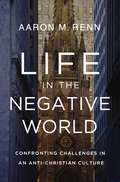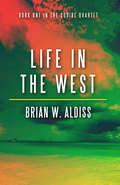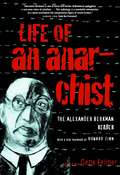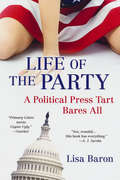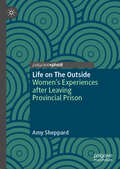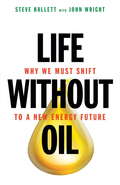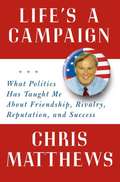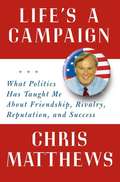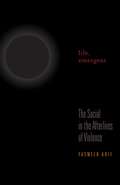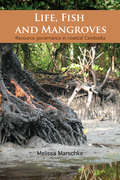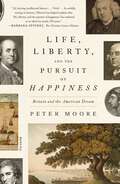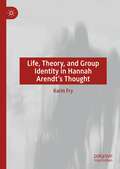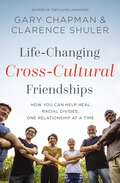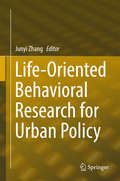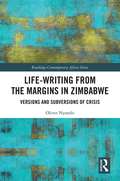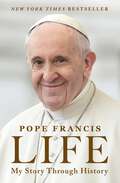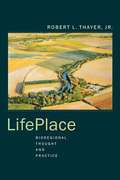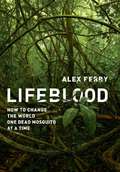- Table View
- List View
Life in Treaty Port China and Japan
by Donna Brunero Stephanie Villalta PuigThis edited volume moves beyond the traditional examination of the treaty ports of China and Japan as places of cultural interaction. It moves ‘beyond the Bund’, presenting instead the history of material culture, the everyday life of the residents of the treaty ports beyond the symbology of Shanghai's waterfront. Bringing for the first time together scholars of China and Japan, museum curators, legal, economic and architectural historians, it studies the treaty ports not only as sites of cultural exchange, but also as sites of social contestation, accommodation and mobility, covering topics as varied as day to day life itself, such as family, property and law, health and welfare, travel, visual culture and memory. The call of this volume is to peel the multiple layers of the encounter between East and West in the treaty ports of China and Japan.
Life in a Cambodian Orphanage: A Childhood Journey for New Opportunities (Rutgers Series in Childhood Studies)
by Kathie CarpenterWhat is it like to grow up in an orphanage? What do residents themselves have to say about their experiences? Are there ways that orphanages can be designed to meet children's developmental needs and to provide them with necessities they are unable to receive in their home communities? In this book, detailed observations of children's daily life in a Cambodian orphanage are combined with follow-up interviews of the same children after they have grown and left the orphanage. Their thoughtful reflections show that the quality of care children receive is more important for their well-being than the site in which they receive it. Life in a Cambodian Orphanage situates orphanages within the social and political history of Cambodia, and shows that orphanages need not always be considered bleak sites of deprivation and despair. It suggests best practices for caring for vulnerable children regardless of the setting in which they are living.
Life in the Ancient Near East, 3100-332 B.C.E.
by Daniel C. SnellIn this sweeping overview of life in the ancient Near East, Daniel Snell surveys the history of the region from the invention of writing five thousand years ago to Alexander the Great’s conquest in 332 B.C.E. The book is the first comprehensive history of the social and economic conditions affecting ordinary people and of the relations between governments and peoples in ancient Egypt, Jordan, Israel, Iran, Iraq, Lebanon, Syria, and Turkey. To set Near East developments in a broader context, the author also provides brief contrasting views of India, China, Greece, and Etruscan Italy. Snell organizes his book chronologically in time spans of about five hundred years and considers broad continuities. Drawing on the latest scholarship in many fields and in many languages, he sets forth a detailed picture of what is known about the demography, social groups, family, women, labor, land and animal management, crafts, trade, money, and government of the ancient Near East. For general readers with an interest in historical events that have influenced the development of Europe and the Middle East, for specialists seeking a broader understanding of early periods of Middle Eastern history, and for anyone with an interest in the Bible, this book offers a fascinating tour of life in ancient Western Asia.
Life in the City of Dirty Water: A Memoir of Healing
by Clayton Thomas-MullerAn electrifying memoir that braids together the urgent issues of Indigenous rights and environmental policy, from a nationally and internationally recognized activist and survivor.There have been many Clayton Thomas-Mullers: The child who played with toy planes as an escape from domestic and sexual abuse, enduring the intergenerational trauma of Canada's residential school system; the angry youngster who defended himself with fists and sharp wit against racism and violence, at school and on the streets of Winnipeg and small-town British Columbia; the tough teenager who, at 17, managed a drug house run by members of his family, and slipped in and out of juvie, operating in a world of violence and pain.But behind them all, there was another Clayton: the one who remained immersed in Cree spirituality, and who embraced the rituals and ways of thinking vital to his heritage; the one who reconnected with the land during summer visits to his great-grandparents' trapline in his home territory of Pukatawagan in northern Manitoba.And it's this version of Clayton that ultimately triumphed, finding healing by directly facing the trauma that he shares with Indigenous peoples around the world. Now a leading organizer and activist on the frontlines of environmental resistance, Clayton brings his warrior spirit to the fight against the ongoing assault on Indigenous peoples' lands by Big Oil.Tying together personal stories of survival that bring the realities of the First Nations of this land into sharp focus, and lessons learned from a career as a frontline activist committed to addressing environmental injustice at a global scale, Thomas-Muller offers a narrative and vision of healing and responsibility.
Life in the Georgian Court
by Catherine CurzonThis lively history of Europe&’s royal families through the 18th and early 19th centuries reveals the decadence and danger of court life. As the glittering Hanoverian court gives birth to the British Georgian era, a golden age of royalty dawns in Europe. Houses rise and fall, births, marriages and scandals change the course of history. Meanwhile, in France, Revolution stalks the land. Life in the Georgian Court pulls back the curtain on the opulent court of the doomed Bourbons, the absolutist powerhouse of Romanov Russia, and the epoch-defining royal family whose kings gave their name to the era, the House of Hanover. Beneath the powdered wigs and robes of state were real people living lives of romance, tragedy, intrigue and eccentricity. Historian Catherine Curzon reveals the private lives of these very public figures, vividly recounting the arranged marriages that turned to love or hate and the scandals that rocked polite society. Here the former wife of a king spends three decades in lonely captivity, King George IV makes scandalous eyes at the toast of the London stage, and Marie Antoinette begins her final journey through Paris as her son sits alone in a forgotten prison cell.Life in the Georgian Court is a privileged peek into the glamorous, tragic and iconic courts of the Georgian world, where even a king could take nothing for granted.
Life in the Negative World: Confronting Challenges in an Anti-Christian Culture
by Aaron M. RennLearning how to live in today's new social and cultural environment will require examination, trial and error, and adaptation over time. But there are ways to live with integrity and follow Christ today, even in a negative world.From a peak in church attendance in the mid-20th century, Christianity has been on a trajectory of decline in the United States. Once positive toward Christianity and Christian moral teachings, cultural shifts toward the mid-90s led many to adopt a more neutral tone toward the Christian faith, seeing it as one option among many in a pluralistic public square. Today, however, Christianity is viewed negatively, and being known as a Christian often means a lower social status in elite society. Christian morality is openly repudiated and viewed as a threat to the new moral order.In Life in the Negative World, author Aaron M. Renn looks at the lessons from Christian cultural engagement over the past 70 years and suggests specific strategies for churches, institutions, and individuals to live faithfully in the "negative" world—a culture opposed to Christian values and teachings. And since there is no one-size-fits-all solution, living as a follower of Christ in the new, negative world and being missionally engaged will require a diversity of strategies.
Life in the West: Life In The West, Forgotten Life, Remembrance Day, And Somewhere East Of Life (The Squire Quartet #1)
by Brian W. AldissFirst in the acclaimed Squire Quartet—from the author of &“Supertoys Last All Summer Long,&” the basis for the movie A.I.: Artificial Intelligence. Thomas C. Squire, creator of the hit documentary series Frankenstein Among the Arts, one-time secret agent and founder of the Society for Popular aesthetics, is attending an international media symposium in Sicily. It is here that he becomes involved with lovely, but calculating Selina Ajdina. Alongside the drama of the conference is the story of Squire&’s private life—the tale of his infidelity, the horrifying circumstances surrounding his father's death, and the threatened future of his ancestral home in England. Winner of two Hugo Awards, one Nebula Award, and named a Grand Master by the Science Fiction Writers of America, Brian W. Aldiss challenged readers&’ minds for over fifty years with literate, thought-provoking, and inventive science fiction. &“A complex, thoughtful and beguiling story by one of our best novelists.&” —William Boyd This ebook includes an introduction by the author.
Life of an Anarchist: The Alexander Berkman Reader
by Alexander BerkmanAlexander Berkman was a twentieth-century American revolutionary. Like the abolitionist John Brown before him, Berkman was hugely idealistic, ready to go to the furthest extreme of self-sacrifice and violence on behalf of justice and civil rights. He decided to assassinate industrialist Henry Clay Frick after reading in the newspaper that Pinkertons hired by Frick had opened fire on the Homestead strikers, killing men, women, and children. Berkman's bungled attempt cost him fifteen years in a federal penitentiary. Upon his release, he became an effective agitator against conscription and was again imprisoned and eventually deported to Russia, where he saw at first hand the early days of Bolshevism. Berkman's writings remain a lasting and impassioned record of intense political transformation. Featuring a new introduction by Howard Zinn, Life of an Anarchist contains Prison Memoirs of an Anarchist, Berkman's account of his years in prison; The Bolshevik Myth, his eyewitness account of the early days of the Russian Revolution; and The ABC of Anarchism, the classic text on the nature of anarchism in the twentieth century. Also included are a selection of letters between Berkman and his lifelong companion Emma Goldman, and a generous sampling from Berkman's other publications.
Life of the Party: A Political Press Tart Bares All
by Lisa BaronBehind our political leaders-yes, even the "moral" ones-is an army of young, horny, professional staffers scrapping it out. Lisa Baron should know-she used to be one of them. With the unerring candor of George Stephanopoulos and the uncensored wit of Chelsea Handler, Baron gives good anecdote on a world where Godaphiles and Press Tarts work together to keep their politicos from imploding...and reveals how a not-so-nice Jewish girl became spokeswoman for the head of the Christian Coalition until she had to kiss that career and its perks-a drunken night with Wayne Newton and a seemingly endless supply of narcotics-good-bye."Sarah Palin, Ann Coulter, and Monica Crowley may think they're pretty bold. But when it comes to baring the secret ardor of a conservative woman, nobody undresses like Lisa Baron." -New York Daily News"Hysterical." -Hollis Gillespie, author of Trailer Trashed"Everything you wanted to know about what goes on behind the Christian GOP curtain but were afraid to ask. Funny, frank, hilarious. " -Michael Murphy, guest columnist for Time magazine"Sex, drugs, interns-rock stars have nothing on Bible-thumping politicos when it comes to sin and raunch." -Suzi Parker, author of Sex in the South"Primary Colors meets Coyote Ugly." -Gawker"Sex, scandal...this book has everything." -A. J. Jacobs
Life on The Outside: Women’s Experiences after Leaving Provincial Prison
by Amy SheppardThis book seeks to understand how women's experiences both within and outside prisons shape their ability to engage in crime-free living after the experience of prison. It uses women's stories to examine their cognitive shifts toward desistance as well as the structural services that may help with the desistance process. It also examines the impacts of addiction and stigma on the desistance processes and develops the theories of desistance. Written by a practitioner, this book includes the voices of service providers who are rarely heard from to provide unique insight into how criminalized women's desistance processes can be supported. It offers intersectional, feminist perspectives and anti-carceral/ abolitionist perspectives.
Life without Oil: Why We Must Shift to a New Energy Future
by Steve HallettBy the end of the 21st century, our oil and natural gas supplies will be virtually nonexistent, and limited coal supplies will be restricted to only a handful of countries. The authors - an environmental scientist and veteran journalist - make abundantly clear that we must plan for a future without reliance on oil, and make a compelling case that the key determinant of our global economy is not so much the invisible hand of the marketplace but the inexorable laws of ecology. They foresee the coming decades as a time of much disruption and change of lifestyle, but in the end we may learn a wiser, more sustainable stewardship of our natural resources. This timely, sobering, yet constructive discussion of energy and ecology offers a realistic vision of the near future and many important lessons about the limits of our resources.
Life's a Campaign
by Chris MatthewsChris Matthews is like no other TV interviewer. Life’s a Campaign is like no other book on success. Famous for demanding the truth from his Hardball guests, Chris Matthews now reveals what the people running this country rarely confess: the secrets of how they got to the top. Here is the first book on power with insight snatched from those who wield it. Life’s a Campaign exposes the tactics, tricks, and truths that help people get ahead–and can help you, too, whatever your field of ambition. Writ...
Life's a Campaign: What Politics Has Taught Me About Friendship, Rivalry, Reputation, and Success
by Chris MatthewsChris Matthews is like no other TV interviewer. Life's a Campaign is like no other book on success. Famous for demanding the truth from his Hardball guests, Chris Matthews now reveals what the people running this country rarely confess: the secrets of how they got to the top. Here is the first book on power with insight snatched from those who wield it. Life's a Campaign exposes the tactics, tricks, and truths that help people get ahead-and can help you, too, whatever your field of ambition. Written in the assertive, good-natured style that is Matthews's trademark, Life's a Campaign is the most useful kind of investigative reporting. You'll benefit from his insider's scrutiny of the Congress, the White House, and the national news media. Here are the methods, showcased in fascinating anecdotes and case histories, that presidents, senators, and other powerful people use to persuade others and win--and the life lessons they provide for the rest of us. You'll learn about Bill Clinton's laser-focused ability to listen to those he wants to seduce--and how he's been teaching that craft to his wife, Hillary; how Ronald Reagan employed his basic optimism to win history to his side; the simple steps in human diplomacy that the first President Bush exploited to assemble a worldwide posse to attack Saddam Hussein and gain global approval in a way his son has failed to do; how Nancy Pelosi became the first woman Speaker of the House by practicing the most fundamental of human qualities: hard-nosed loyalty. You'll also find out, for the first time, about Matthews's own wild ride through the turbulent, converging rapids of politics and journalism. The big payoff in Life's a Campaign is what you'll learn about human nature: * People would rather be listened to than listen. * People don't mind being used; what they mind is being discarded. * People are more loyal to the people they've helped than the people they've helped are loyal to them. * Not everyone's going to like you. * No matter what anybody says, nobody wants a level playing field. Knowing such truths is the successful person's number one advantage in life. As you'll learn in Life's a Campaign, mastering--and employing--these truths separates the leaders from the followers.
Life, Emergent: The Social in the Afterlives of Violence (A Quadrant Book)
by Yasmeen ArifHow does an inquiry into life as it lives (or dies) amid mass violence look like from the perspective of the &“social&”? Taking us from Sierra Leone to India to Lebanon, Life, Emergent challenges conventional understandings of biopolitics, weaving a politics of life through the lens of life, not death. Arguing that the &“letting die&” element of biopolitics has been overemphasized, Yasmeen Arif zeros in on biopolitics&’ other pole: &“making live.&” She does so by highlighting the various means and the forms of life configured in the aftermath—or afterlives—of violent events in contexts of law, justice, community, and identity. Her analysis of the social repercussions is both global and local in scope. Arif examines the convictions made in the Special Court of Sierra Leone, the first hybrid court of its nature under international criminal law. Next, she explores the making of a justice movement in the context of Hindu–Muslim violence in 2002 in the state of Gujarat, India. From there she revisits the Sikh carnage in Delhi of 1984. Finally, she explores a span of civil violence in Lebanon, and particularly, its effects on the city of Beirut. This rigorously argued book brings together the various strands of life and the social that each chapter has disentangled—and in doing so it begins to frame a politics of, and in, life.
Life, Fish and Mangroves: Resource Governance in Coastal Cambodia (Governance Series)
by Melissa MarschkeIn Life, Fish and Mangroves, Melissa Marschke explores the potential of resource governance, offering a case study of resource-dependent village life. Following six households and one village-based institution in coastal Cambodia over a twelve-year period, Marschke reveals the opportunities and constraints facing villagers and illustrates why local resource management practices remain delicate, even with a sustained effort. She highlights how government and business interests in community-based management and resource exploitation combine to produce a complex, highly uncertain dynamic. With this instructive study, she demonstrates that in spite of a significant effort, spanning many years and engaging many players, resource governance remains fragile and coastal livelihoods in Cambodia remain precarious.
Life, Liberty, and the Pursuit of Happiness: Britain and the American Dream
by Peter Moore“Gripping . . . Vibrant . . . A wonderfully absorbing and stimulating book.” —Sarah Bakewell, NBCC Award–winning author of How to Live and Humanly Possible“[A] rollicking account . . . The book’s compulsive readability is a tribute to Moore’s skill at cracking open the pre-revolutionary period.” —Charles Arrowsmith, The Washington PostA spirited group biography that explores the origins of the most iconic words in American history, and the remarkable transatlantic context from which they emerged.The most famous phrase in American history once looked quite different. “The preservation of life, & liberty, & the pursuit of happiness” was how Thomas Jefferson put it in the first draft of the Declaration, before the first ampersand was scratched out, along with “the preservation of.” In a statement as pithy—and contested—as this, a small deletion matters. And indeed, that final, iconizing revision was the last in a long chain of revisions stretching across the Atlantic and back. The precise contours of these three rights have never been pinned down—and yet in making these words into rights, Jefferson reified the hopes (and debates) not only of a group of rebel-statesmen but also of an earlier generation of British thinkers who could barely imagine a country like the United States of America.Peter Moore’s Life, Liberty, and the Pursuit of Happiness tells the true story of what may be the most successful import in US history: the “American dream.” Centered on the friendship between Benjamin Franklin and the British publisher William Strahan, and featuring figures including the cultural giant Samuel Johnson, the ground-breaking historian Catharine Macaulay, the firebrand politician John Wilkes, and revolutionary activist Thomas Paine, this book looks at the generation that preceded the Declaration in 1776. Everyone, it seemed, had “life, liberty, and the pursuit of happiness” on their minds; Moore shows why, and reveals how these still-nascent ideals made their way across an ocean and started a revolution.Includes 16 pages of black-and-white images
Life, Theory, and Group Identity in Hannah Arendt's Thought
by Karin FryPhilosophy typically ignores biographical, historical, and cultural aspects of theoriss’ lives in an attempt to take a supposedly abstract and objective view of their work. This book makes some new conclusions about Arendt’s theory by emphasizing how her experience of the world as displayed in her archival materials impacted her thought. Some aspects of Arendt’s life have been examined in detail before, including the fact she was stateless as well as her affair with Heidegger. Instead, this work explores different topics including the biographical and narrative moments of Arendt's own work, the role of archiving in her thought, pivotal events that have not been archived, her understanding of her own identities, and how it affected the role of identity politics in her work. Typically, group action is underemphasized in Arendt scholarship in comparison to individual action and often identity politics questions are considered to lie within the realm of the private. Although Arendt’s theory is problematic when discussing issues concerning identity politics, she did think identity politics could be public and political and that effective political actions may occur within groups. What makes this project unique are the innovative conclusions made by moving the archival and biographical evidence to the center in order to understand her theory more accurately and within its historical and cultural context. This volume will be of interest to professional scholars in Arendt’s work, but also to those who have a more general interest in her life and theory.
Life-Changing Cross-Cultural Friendships: How You Can Help Heal Racial Divides, One Relationship at a Time
by Gary Chapman Clarence ShulerWe can heal our communities--one friendship at a time.Many of us want to do something to improve race relations, but we don't know where to start or even if we can make a difference. In Life-Changing Cross-Cultural Friendships, beloved authors and good friends Gary Chapman and Clarence Shuler answer those questions and more by recounting their own story together.Long before Gary was the bestselling author of The 5 Love Languages and Clarence was the president and CEO of Building Lasting Relationships, they were just an associate pastor and a young high school student, bonded by a love of Christ and learning how to navigate their newly desegregated community. Decades of friendship later, they are sharing the important lessons they learned that will enable you to experience enriching friendships across racial and ethnic barriers.Each chapter of this inspiring and practical book will guide you into a deeper level of understanding about what friendship is and about the benefits of cross-cultural friendships on an individual and national level. These powerful lessons will include:The importance of choosing the right wordsHow to differentiate true friends from mere acquaintancesHow Jesus initiated a cross-cultural relationshipThe first two steps to your own cross-cultural friendshipThree ways to resolve conflict in a cross-cultural friendshipHow to make friendships last through life's many seasonsBreaking down the walls of division might not be easy, but the simple act of building friendships tears down walls of racism and fear. Will you accept the cross-cultural friendship challenge?
Life-Oriented Behavioral Research for Urban Policy
by Junyi ZhangThis book presents a life-oriented approach, which is an interdisciplinary methodology proposed for cross-sectoral urban policy decisions such as transport, health, and energy policies. Improving people's quality of life (QOL) is one of the common goals of various urban policies on the one hand, while QOL is closely linked with a variety of life choices on the other. The life-oriented approach argues that life choices in different domains (e. g. , residence, neighborhood, health, education, work, family life, leisure and recreation, finance, and travel behavior) are not independent of one another, and ignorance of and inability to understand interdependent life choices may result in a failure of consensus building for policy decisions. The book provides evidence about behavioral interdependencies among life domains based on both extensive literature reviews and case studies covering a broad set of life choices. This work further illustrates interbehavioral analysis frameworks with respect to various life domains, along with a rich set of future research directions. This book deals with life choices in a relatively general way. Thus, it can serve not only as a reference for research, but also as a textbook for teaching and learning in varied behavior-related disciplines.
Life-Writing from the Margins in Zimbabwe: Versions and Subversions of Crisis (Routledge Contemporary Africa)
by Oliver NyambiThis book explores the unique contributions of various forms of post-2000 life-writings such as the autobiography, epistles, and biographies, to discourses about the nature and socio-politics of what has become known as the Zimbabwean crisis (c. 2000–2009). Much of what has been written about the Zimbabwean crisis – a decade-long period of unprecedented economic collapse and political upheavals in the southern African country – is strictly discipline-specific and therefore limited to unidimensional modes of theorising the crisis’s many and complex dimensions and dynamics. In this context, this book charts a paradigm shift in hermeneutic and epistemological approaches to comprehending the Zimbabwean crisis. Life-Writing from the Margins in Zimbabwe centres the experiences and memories of ordinary Zimbabweans in pluralizing modes of seeing and knowing the crisis. The book argues that these life-writings present a rich site for encountering versions of the crisis that relate in counter-discursive ways, to the dominant, state-authored narrative of the nation in crisis. Oliver Nyambi’s analysis contributes new ideas to ongoing debates about how cultural texts reflect on the postcoloniality of both power, and experiences and negotiations of power in the context of crisis. This book will be of interest to scholars and students of African literature, Zimbabwean/African studies, postcolonial literature, life-writing and cultural studies.
Life: My Story Through History
by Pope FrancisFor the first time, Pope Francis tells the story of his life as he looks back on the momentous world events that have changed history—from his earliest years during the outbreak of World War II in 1939 to the turmoil of today. An extraordinary personal and historical journey, Life is the story of a man and a world in dramatic change. Pope Francis recalls his life through memories and observations of the most significant occurrences of the past eight decades, from the Holocaust to the fall of the Berlin Wall, Videla’s coup in Argentina to the moon landing in 1969, and even the 1986 World Cup in which Maradona scored the unforgettable “hand of God” goal.Here are the frank assessments and intimate insights of a pastor reflecting on the Nazi extermination of the Jews, the atomic bombings of Hiroshima and Nagasaki, the 2001 terrorist attack on America and the collapse of the Twin Towers, the great economic recession of 2008, the Covid-19 pandemic, the retirement of Pope Benedict XVI, and the subsequent conclave that elected him Pontiff. The “pope callejero” recounts these world-changing moments with the candor and compassion that distinguishes him, and offers important messages on major crises confronting us now, including social inequalities, climate change, international war, atomic weapons, racial discrimination, and the battles over social and cultural issues.Translated from the Italian by Aubrey Botsford
LifePlace: Bioregional Thought and Practice
by Robert L. Thayer Jr.This is a passionately written advocacy of bioregionalism, the conviction that people should live, work, play, and consume locally, for the health of the environment and for society. The book is inspirational as well as educational, a combination of philosophy and practical suggestions for implementing bioregionalism in communities.
Lifeblood: How to Change the World One Dead Mosquito at a Time
by Alex PerryIn 2006, the Wall Street pioneer and philanthropist Ray Chambers flicked through some holiday snapshots taken by his friend, development economist Jeff Sachs, and remarked on the placid beauty of a group of sleeping Malawian children. ?TheyOCOre not sleeping, OCO Sachs told him. ?TheyOCOre in malarial comas. A few days later, they were all dead. OCO Chambers had long avoided the public eye, but this moment sparked his determination to coordinate an unprecedented, worldwide effort to eradicate a disease that has haunted humanity since before the advent of medicine. Award-winning journalist Alex Perry obtained unique access to Chambers, now the UN Special Envoy for Malaria. In this book, Perry weaves together science and history with on-the-ground reporting and a riveting expos(r) of the workings of humanitarian aid to document ChambersOCO campaign. By replacing traditional ideas of assistance with business acumen and hustle, Chambers saved millions of lives, and upturned current notions of aid, forging a new path not just for the developing world but for global business and philanthropy.
Lifeblood: Oil, Freedom, and the Forces of Capital (A Quadrant Book)
by Matthew T. HuberIf our oil addiction is so bad for us, why don&’t we kick the habit? Looking beyond the usual culprits—Big Oil, petro-states, and the strategists of empire—Lifeblood finds a deeper and more complex explanation in everyday practices of oil consumption in American culture. Those practices, Matthew T. Huber suggests, have in fact been instrumental in shaping the broader cultural politics of American capitalism.How did gasoline and countless other petroleum products become so central to our notions of the American way of life? Huber traces the answer from the 1930s through the oil shocks of the 1970s to our present predicament, revealing that oil&’s role in defining popular culture extends far beyond material connections between oil, suburbia, and automobility. He shows how oil powered a cultural politics of entrepreneurial life—the very American idea that life itself is a product of individual entrepreneurial capacities. In so doing he uses oil to retell American political history from the triumph of New Deal liberalism to the rise of the New Right, from oil&’s celebration as the lifeblood of postwar capitalism to increasing anxieties over oil addiction.Lifeblood rethinks debates surrounding energy and capitalism, neoliberalism and nature, and the importance of suburbanization in the rightward shift in American politics. Today, Huber tells us, as crises attributable to oil intensify, a populist clamoring for cheap energy has less to do with American excess than with the eroding conditions of life under neoliberalism.
Lifeboat
by James White[from the back cover:] "Disaster! The passengers were the usual varied lot, some nervous, some boisterous, some smart-aleck, some quiet. The ship's Medical Officer was brand new and didn't anticipate having to do much more than take care of a few queasy stomachs and bruises among his charges--from learning how to handle weightlessness. It was a routine trip. And so was the safety drill. Until the disaster call went out... " If you enjoyed this suspenseful novel about humanity's adjusting to life beyond earth in the future you'll enjoy the many more books by James White in the Bookshare collection.
